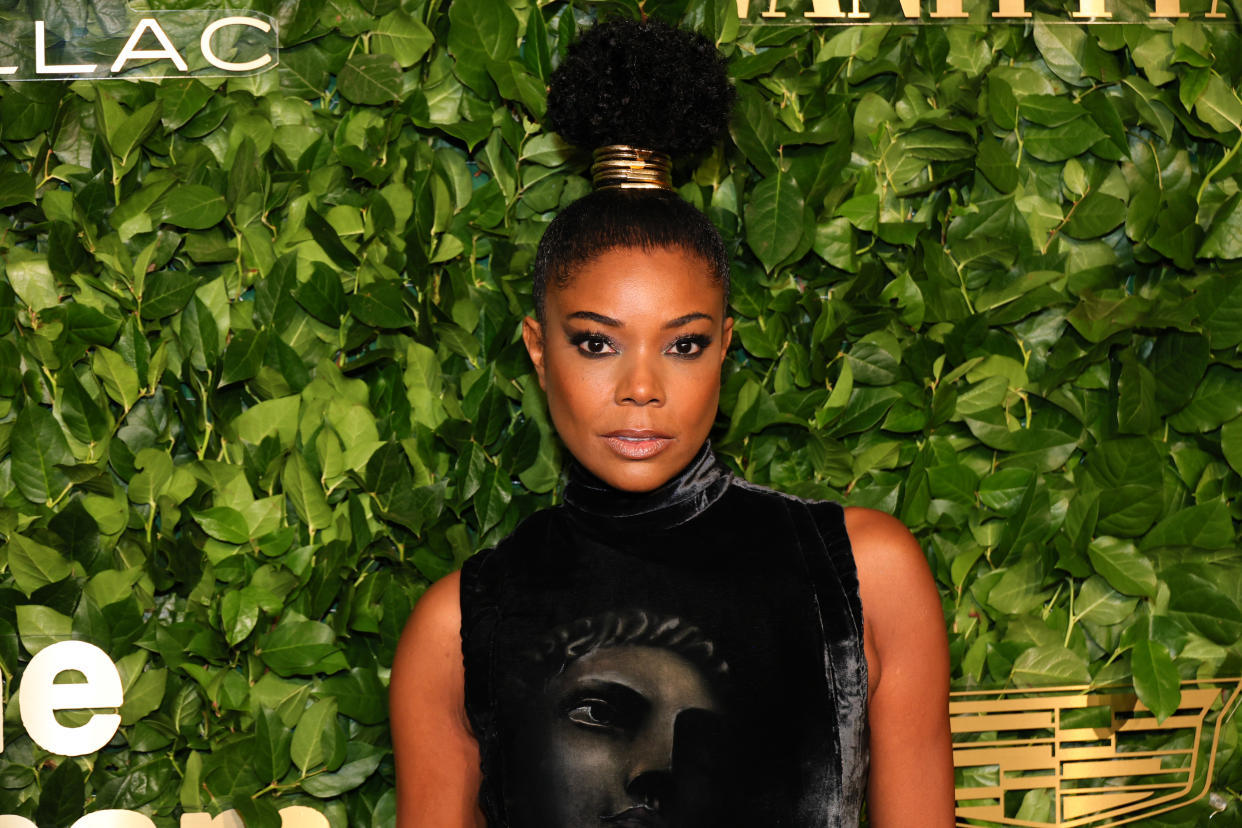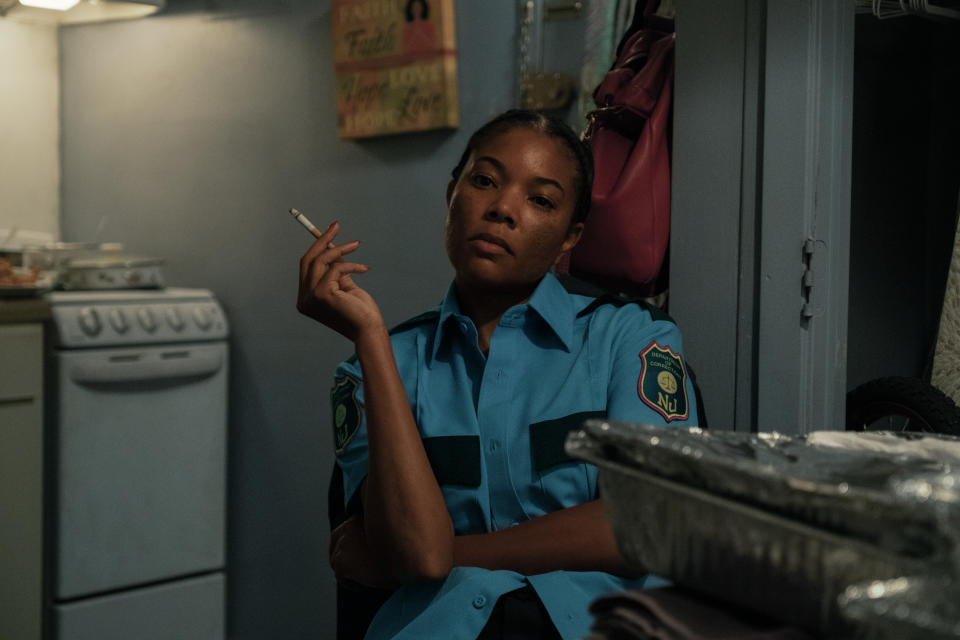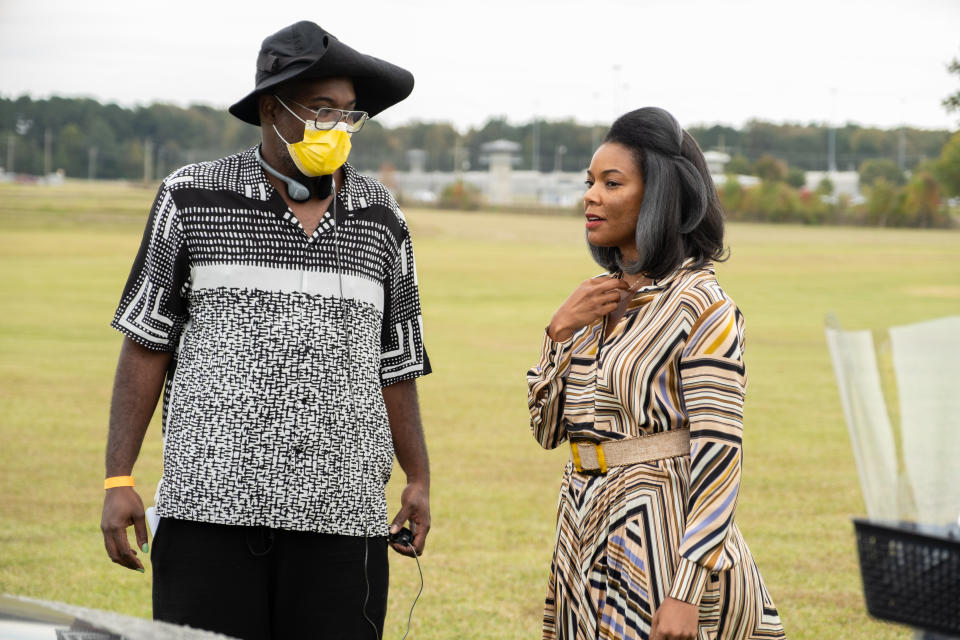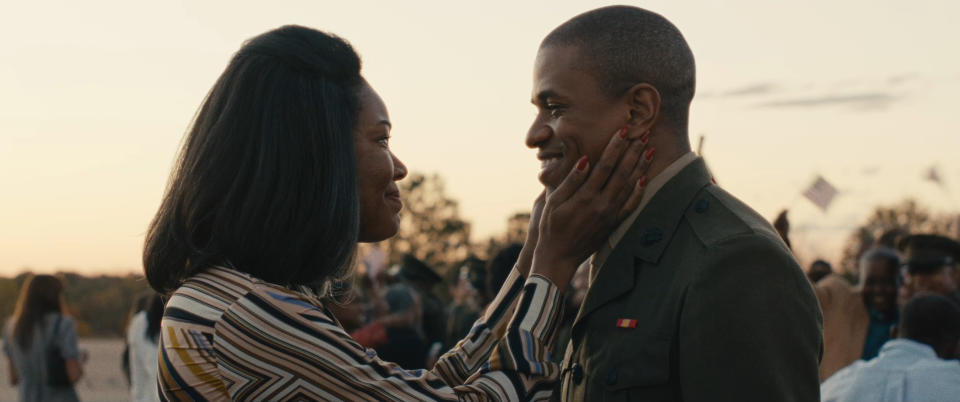With ‘The Inspection,’ Gabrielle Union ‘Didn’t Have to Shrink’ — Finally

- Oops!Something went wrong.Please try again later.
- Oops!Something went wrong.Please try again later.
- Oops!Something went wrong.Please try again later.
- Oops!Something went wrong.Please try again later.
Need she remind you, Gabrielle Union has been a successful actress for a very long time. “But the way that people think of projects that center the Black community, Black audiences, Black needs/wants/desires, it’s like those No. 1 movies didn’t count,” she told IndieWire during a recent interview in Los Angeles. “The amount of success that me and my friends have had, with the budgets we’ve been given and the time we’ve had to shoot, it’s like it doesn’t count. And so the reinvention never stops.”
While she appreciates that she and her peers like Regina Hall, Regina King, and Sanaa Lathan are in a space where their best work seems ahead of them — “We’ve never worked more. It’s like being an ingenue at 50,” she said — Union has often put her focus on choosing opportunities that could spell commercial success. In the past, pitching film execs, “I was always like, ‘I put asses in seats. I can sell. I know what that is. I know how to deliver. I can be on time as a producer, as a talent, I got this,’” said the actress. “But when you’re selling the business, they lose the ability to see your entire self. And you shrink to meet those needs.”
More from IndieWire
Yes, That's Eddie Redmayne Playing America's Most Prolific Serial Killer
Why Ramin Bahrani Chose to 'Print the Legend' of the Bulletproof Vest Inventor in '2nd Chance'
With her transformation into Inez in “The Inspection,” a tragic, menacing mother role that is a departure from her sunnier fare, but has gained her attention from awards bodies like the Gothams and Indie Spirits, Union finally started to believe in her actual artistry the same way writer-director Elegance Bratton did. “He’s like, ‘We’ve always known that you’ve had the range. They just didn’t,’” recalled the star. “With Elegance, I didn’t have to shrink it all. I had to step up to where he thought I was.”
Here, Union discusses how Bratton and executive producer Effie Brown challenged her, what it was like to also produce the inspirational A24 film about a gay man joining the Marines to help repair his relationship with his mother (based on Bratton’s own life story), the lessons she has learned through embracing her Blackness, and what kind of advice she’s imparted to co-star Jeremy Pope.
This interview has been edited and condensed for clarity.
IndieWire: How did “The Inspection” come your way?
Gabrielle Union: Initially Effie and Elegance reached out about me executive producing, and I was like, “Oh, this tracks.” I read the script. I’m like, “This is brilliant. This is a winner. I see how I can be additive as an exec.” And they’re like, “Mmhmm, great. We also would like you to play the mother.” And I was like “…Why?” Because of course, as I’m reading it, I’m thinking of 1,000 other actresses that I want to suggest, [but] Elegance had an unusual level of confidence in me that I did not have in myself. And he said, “It has to be you. It can only be you.” I was like, “What the—” And then my ego was like “Girl, say yes.”
So I think he just got me at the right time when I was just at a crossroads in my career knowing I just want different, and I want to work with people that get it, who understand what the point is. Sometimes the point of doing these projects gets lost in the corporate structure of the business now. There’s times where you just feel empty like, “This cannot be it for the rest of my life.” I’m looking at my prenup like, “OK, so if I never work again, how far am I falling?”
But yeah, he just got me at the right place being open and I believed him. Usually when people give me compliments in this town, I’m like, “You’re full of shit.” But in this case, I opted to believe him, that I could do this. And then I was like, “How the fuck am I gonna do this? I’ve never had to do this kind of work.” There’s certain girls you think of for certain projects, and I’m not one of those for these kinds of projects. I tend to stick to characters that are a lot closer to my personality, that are seamless. I don’t have to work that hard, yeah. And I realized, “Oh shit, I’ve been judging every one of my characters,” and that judgment acts out on screen. But with this, I’m like, “I’m gonna have to actually work.” And then I did.

Patti Perret/A24 Films
I know you didn’t quite see yourself in Inez reading the script, but did you see yourself in Jeremy’s character, Ellis French? You talk a lot in your memoirs about assimilation, and navigating an environment that’s hostile toward your identity. Did that aspect draw you toward “The Inspection” as a producer?
Yeah, the notion that I’m going to strip you of your identity to somehow protect your humanity, which is… dafuq? That has been the goal since before they brought us here. I literally just got back from Africa and we were at this river, which was where they did the last bath of the enslaved after basically forcing them to walk the distance from New York to Florida. And they would bathe them in this river and try to shine them up before they’re sold and branded and sent on the ships and whatnot. And you realize how they try to break you, how they try to strip you of your language, religion, identity — of everything that makes you unique — so you can become a cog in a machine.
This industry is no different. The journey of French is indicative of that. The journey of Inez is indicative of that. She just got sucked in and never could find her way out. And couldn’t figure out, “How do I square loving my child with my version of protecting my child?”
Right, with Inez there’s an element of “I had this picture in my head of what you could be, and I placed a huge bet on you, and you’ve made me feel like I was dealt a losing hand because life is even more stacked against you now.”
When you’re poor and Black, and she was a teen mom, and single mom literally up against the world. She’s like, “And you want to make it harder? Are you fucking crazy?” But as Black mothers, from the second our children are born, we start checking their nail beds and their ears to see how dark they’re going to be, to see how rough the road is going to be for them. When we start thinking about their friends, the schools, who their friends are, how they dress, how they present themselves, and you’re trying to force them into this tiny, tight box that you think is going to keep them safe and worthy of the American dream.
But it requires full assimilation, to basically morph into the oppressor, thinking that that’s gonna somehow create a seat at a table that you’ll never be welcome at. It’s a sick game where the bar keeps moving. So you keep shape shifting, you keep tap dancing, and you think, “Oh, my God, I’m getting a little closer. They’re seeing me, they’re seeing me. Oh, my God. This is good, this is fine — Wait what? What the fuck? They’re burning a cross on my lawn? LeBron James, they wrote n***er on his door during the championship?” It’s a sick game that you will never win.
I realized that I had that thing in common with Inez when I was like, “How am I going to share in common with this woman? How am I going to get in?” You start thinking, “OK, what did she want before she had a kid?” And you’re like, “You want everything.” You want everything that they promise you. You want the American dream. You want the milk and honey. You want it all. She was like valedictorian, she was a great fucking student, and when you’re a great student, they say your education is your way out, respectability politics is your way out, if you just do all these things.
That’s where the tap dancing starts. And I’ve been tap dancing my whole life, thinking that if I just stay in this box, they will see me as good and different than the others, and worthy of being exalted and whatever. And it’s like “Fuck!” You realize that you make soul sacrifices. For some people, those soul sacrifices include their fucking kids. And while I’m not sacrificing my children, I sacrifice my scruples. I sacrifice relationships, I sacrifice my upper lip. I sacrifice my own identity and my Blackness for a dream, for fool’s gold, for something that doesn’t exist, because they don’t want it to exist. They want the idea to exist, but they don’t ever want you to actually achieve that.

Patti Perret
How do you feel about the praise or criticism, however you want to see it, of people saying, “I wish we saw more of her in the film.” Especially when the arc with this character is so sensitive, given how Elegance’s mother died shortly before production, and this film is autofictional. The ending is very powerful.
Selfishly, of course, as an actress, you’re like counting your lines, like, “More? What? You think I should be in it more?! Yes, I agree.” But the reality of the story, and what I signed up for, and understanding Elegance and his mother’s reality, she was absent. To create more would be to rewrite history in a way that is kind of harmful, because she wasn’t present. So to shove her in places that she didn’t actually show up for, we lose some of the yearning and the longing. It negates why it’s so fucking important when she finally does show up. Because this woman did not. She did not show up for her kid. She barely answered the phone for her child. It took him that whole thing first for her to open the door. She didn’t want him to sit down on the couch.
You can’t then take that kind of character and stick her in more places. It’s just not realistic, it’s not true. Also as an executive producer, we got greenlit on February 14th, and she died on the 18th, just four days later. And not only was he grieving, he’s still grieving, but there was the urge to [rewrite the script].
You know what your grief can do. Grief can soften edges or can make them harder, pointier than perhaps they were. And we all wanted to stick to what he wrote when she was alive. We didn’t want it to change to reflect the grief process. Because it’s a small window, and now there was a fight for all of us. The mother in me was like, “Can’t she just—” and it’s like, “No.” And he wanted to rewrite. There’s a part of you that wants different because she’s gone. And there’s no next day, and it sucks, because audiences are like, “So what’s your relationship like now? He’s like, “You know…”
But in a way it’s still building.
It’s still building because you can go to therapy and make peace with her soul. Which I think was a little bit more pure and loving then how she demonstrated that, but it’s tough. The whole thing’s tough and fucking dark. Because I gotta go home to my kid who is not living a completely unfamiliar journey.

You’ve joked about hopping into Jeremy’s Instagram DMs to sell him on playing French, what was your relationship like when you two started working together? And also as someone who had been in this industry a long while, how does it feel to see someone like him succeed? I don’t think we’ve seen someone get to live their truth and be celebrated so early.
Yeah, I was a fan. I’d seen him on Broadway. I’ve seen his work. I’ve watched “Hollywood.” So when I hopped in his DMs, I hopped in his DMs as a fan and as an elder statesman in Black Hollywood, hoping that maybe he knew who I was. And luckily, just from how me and my husband live our lives, he was much more receptive. But I’m also an executive producer hoping that he signs on to this dream project, and then also revealing as an actor that I would be playing the mom, and would he be open to making magic together?
He responded really quickly, and since his response, we’ve been bonded. Every day on filming, if you didn’t see us literally holding hands or in an embrace, that’s because one of us went to the bathroom, like we just had to stay [and] keep the love there. We didn’t want our love for each other to ever not be present. And Inez and French’s love for one another, which is part of the motivation, how it manifested poorly on Inez’s part, but our relationship is, that’s my baby.
Watching him live the dream, I offer my elder statesman, heavy-handed advice at times. But a lot of it is structural. That people don’t share how to fucking navigate this business and not lose your mind, not lose your money, not fuck up your credit not, not end up in jail because you didn’t pay your taxes. All that stuff that, being a real ally, and mentor, and big sis/big bro in this town, people sometimes forget because it’s not the sexy part. But that’s the shit that can fuck up your life.
Preparing you for how things change in your family, and how you move through the world. It’s weird. It is weird to be in a fishbowl when you’re used to connecting, and looking people in the eye, and wanting to talk to people, and you’re like, “Oh, wait, you’re not talking to me. You’re talking to my character. Shit, that’s weird. OK, what am I supposed to do with this?” And you go home and you’re like, “Am I empty? I feel like my well is kind of dry. Or it’s overflowing and I’m still parched.” And what do you do with that? I try to pay it forward in the same way [my OGs did].
That’s my relationship with Jeremy, now that the film is wrapped. When you see us on a press line, we are holding on to each other or hugging because this is where we’re mining a lot of the darkness that we’re still working out in therapy.
A24’s “The Inspection” expands to theaters nationwide this weekend.
Best of IndieWire
Quentin Tarantino's Favorite Movies: 48 Films the Director Wants You to See
New Movies: Release Calendar for December 2, Plus Where to Watch the Latest Films
51 Directors' Favorite Horror Movies: Bong Joon Ho, Quentin Tarantino, Guillermo del Toro, and More
Sign up for Indiewire's Newsletter. For the latest news, follow us on Facebook, Twitter, and Instagram.

